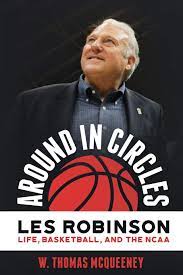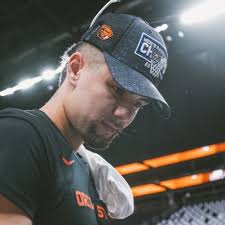It takes a special kind of coach who can get the job done for 5+ years at 3 different schools, which is exactly what Les Robinson did back in the day. He spent 11 years at The Citadel, 5 years at East Tennessee State, and then 6 years at NC State. He got his basketball education at NC State as a player/student assistant coach/graduate assistant coach under a pair of legends in Everett Case/Press Maravich. He was a 2-time SoCon COY at The Citadel, made back-to-back NCAA tourneys at East Tennessee State, then became 1 of a handful of 1st-year coaches in ACC history to win an NCAA tourney game. HoopsHD’s Jon Teitel got to chat with Coach Robinson about almost upsetting a #1 seed and seeing how the ACC has changed. Today is Coach Robinson’s 79th birthday so let us be the 1st to wish him a happy 1!

You went to college at NC State: how did you 1st get into coaching? I made the decision from an early age. I have a yearbook from 6th grade that my mother made me fill out even though I did not want to. I listed Perry Como as my favorite singer and under occupation I wrote down “basketball coach”. We lived near Marshall University and my dad ran a basketball tournament to help profit the local YMCA. I watched Coach Cam Henderson at Marshall, who brought the fast-break to college after seeing Clair Bee use it. I was enthralled watching the coach work with his players and I never dropped it. I studied the coaches in my school way back in 7th/8th grade. I did not understand why I had to study English and other classes: my dad explained that every coach has to have a diploma on his wall. Coach Press Maravich said that I would become the #2 assistant as a 21-year old the day that Coach Everett Case stepped down. I became the coach of the freshman team and was very nervous, but halfway through my 1st practice I realized that even though I did not know everything I knew a hell of a lot more than the freshmen!
You were a 2-time SoCon COY at The Citadel: what did it mean to you to receive such outstanding honors? It meant a lot because it is a very difficult place to coach. I learned a lot on the job as an assistant about the mistakes that some head coaches make at a military school. You can be great at Xs and Os but you have to know who to recruit. We signed 9 guys 1 year…and 6 of them were gone by the end of September! When I became head coach I might take the 3rd-best recruit because the top-2 might not fit in: it takes a special person to succeed here. We lost to NC State 1 year: Coach Norm Sloan asked me why I scheduled his team and I said that it was because it would help recruiting and we needed some guarantee games. He punched me in the chest and told me that it was important to schedule people you could beat, so I changed my scheduling after that. I actually had to drop 2 non-conference games so that we would be eligible to play in the NCAA tourney. Coach Bobby Knight taught me that 1 of the perks of coaching at a military school is that you can have as many managers as you wanted, so I bought a bunch of Street and Smith magazines and had the managers help me figure out who we could play that year.
You finished your tenure as the winningest coach in Citadel history: what made you such a good coach? I had the most winning seasons and was not looking for another job. I ran into Coach Sonny Smith 1 day, who had previously coached at East Tennessee State. Sonny was going to become the new coach at ETSU…but he got hot in the 1984 NCAA tourney thanks to 1 of his players named Charles Barkley and I ended up getting the job instead.
In the 1989 NCAA tourney as head coach at East Tennessee State, Greg Dennis had 20 PTS/15 REB in a 1-PT loss to #1-seed Oklahoma: how close did you come to becoming the 1st #16-seed to ever win a tourney game? I thought that it would happen someday because there is more parity today than ever before, even though the #1 seeds are very good. I later joined the Selection Committee and learned that the Committee had seeded us too low in 1989: we should have been a #14-seed. We helped get the rule started where you ship a low-seeded team away from home. If Keith “Mister” Jennings had not fouled out then we would have won: he was the glue that kept everyone together. He wanted to walk on at JMU but we were his only D-1 offer.
In the 1990 NCAA tourney Dennis Scott scored 36 PTS/14-22 FG in a win by Georgia Tech: where does Scott rank among the best scorers that you have ever seen? He ranks way up there: he is 1 of the best. I grew up with Jerry West, who was a pretty good scorer, and Rod Hundley was also 1 of my heroes.
In the 1991 NCAA tourney as head coach at NC State you had 6 players score in double-digits en route to a 114-85 win over Southern Miss: how did you create such an unstoppable offense in your very 1st year? I had 5 great players that year including the 2 best guards in America: we beat Duke, UConn, and North Carolina. Players make coaches great and a good motion offense does not turn the ball over a lot. I learned it from Coach Dean Smith and it really helped my career. I was hired with the primary purpose of improving academics/graduating players: we were the only 1 of the 27 athletic teams at NC State who required players to have a minimum GPA after their 1st semester. At The Citadel I could recruit kids through their high school coaches, but at NC State I had to go through AAU coaches, some of whom were literally drug dealers who ended up in jail.
In the 1993 season you were only able to dress 7 players for conference games due to injuries/suspensions: how did you deal with such an impossible situation? We had some scholarships taken away from us and also had a couple of injuries: I had to dress a manager just to hold a 5-on-5 practice! I had forgotten about that: it was pretty much rock-bottom. When I took over at ETSU I did not know that the school had self-reported some cheating the prior coach did so that they would not have to pay him, but the NCAA penalized the school because some of the players had received money. I was dealt some poor hands.
You served as athletic director at all 3 of the schools where you coached: what was the best part of being an administrator, and what was the worst part? I never had a desire to be an athletic director but I must have had some skills that helped me do it. The ETSU president called me up and asked me to be AD: I told him that I preferred to coach but the president said that I could do both. My assistant AD handled most of the day-to-day stuff: I just had to shake hands and raise money. When I became AD at NC State I told my friends that it was like becoming a grandfather: you still get to be around the kids but you do not have to change the dirty diapers!
You have been around the ACC for more than 50 years: what is your impression of how it has changed since the 1960s? Some of the old guys might turn over in their graves but that is just modern-day college athletics: TV and money. I still love watching the old rivals play each other but I worry about the student crowds slipping. When you play a team that is new to your conference and scattered far away from your campus and is not a “feature game”, you might not go watch it in person. In my day every team’s fans knew every single conference opponent and the atmosphere for big games helped players rise to the occasion. Just look at Kentucky: they have a sell-out crowd every single night.
When people look back on your career, how do you want to be remembered the most? Just as someone who treated his players properly and helped them grow into men who had good careers either on or off the court. I am so proud when I get letters from former players who went on to have a successful life: that is my legacy. Wins are important but you get into it because you enjoy working with young people: I hope that I had a profound influence on many of my players.







